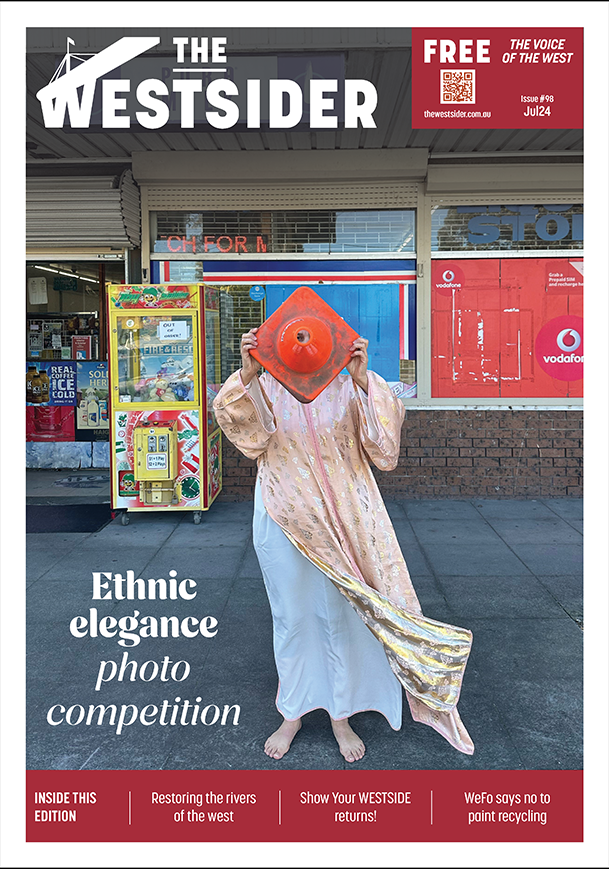By Peter Dewar
There was little doubt a growing nation needed fuel. And plenty of it. But not everyone was happy when petrochemical facilities came to Spotswood. On March 20, 1940, residents’ worst fears turned into reality after a loud boom shattered the quiet around 10 pm. It meant only one thing … an explosion near the railway siding.
During the next hour, drums of kerosene, petroleum and oil stored at Vacuum Oil Company’s depot ignited like an inflammable row of dominoes. Orange flames shot high into the air; debris hurled streets away. Firemen worked frantically in dangerous conditions until chemical foam could be used to subdue the pyrotechnic monster.
How did Westies react to ‘one of the fiercest fires seen in Melbourne for years’?
By turning out in thousands. Some came in pyjamas and dressing gowns. The chaotic scene was captured by The Argus newspaper: ‘Hundreds of police and military guards quickly threw a cordon around the company’s installation, and soldiers with fixed bayonets held back the huge crowd’.
It’s not surprising environmentalists emerged in an industrial centre the magnitude of yesteryear’s inner west where, as the Spotswood blaze revealed, there was much to learn about living with industry as a neighbour.
For the 2001 Centenary of Federation, Maribyrnong Council and Footscray Historical Society collaborated in a series called In the Spirit of Change. Four exhibitions honoured those who’d made a difference in the previous 100 years. Environmental Heroes introduced three visionaries who worked to beautify and protect the west’s natural landscape.
In 1916, Dave Reeve Matthews was appointed by Footscray Council as the Superintendent of Parks and Gardens when the district was almost completely devoid of parks and recreation reserves. By the end of his tenure fifty years on, 80 hectares of parkland had been created for gardens and facilities for hundreds of sporting clubs.

Matthews was assisted by plant classifier William Henry Nicholls who was also a bookbinder, gifted botanical artist and orchidologist. His book Orchids of Australia was published in 1965 to world-wide acclaim.
Theirs was an inspiring legacy. In 1953 The Argus coined Footscray a ‘Garden City’ informing readers that inner-west residential areas dotted by parklands and gardens were ‘as attractive as any east of Melbourne’.
Footscray was particularly proud of the Botanical Gardens with its sweeping lawns and expansive river view. Once council took over from volunteers Matthews assumed responsibility for transforming a barren, rocky outcrop to the ‘largest and most intact Edwardian period gardens in Victoria’.
David Matthews helped found the Footscray and District Tree Planters Association and was made a Member of the British Empire (OBE) in 1965.
The greening of the west was an undoubted accomplishment. But the task of curbing Footscray’s notorious industrial pollution seemed insurmountable.
Enter a humanitarian with a larrikin’s humour, who grabbed headlines for his crusade against polluters. From 1963 for 25 years, ‘dinky di’ Matt Harris served the City of Footscray as a ward councillor including two terms as mayor. This accidental eco-activist’s theatrics were legendary, and on occasions exactly what was needed.
Unable to convince colleagues at a council meeting that industrial waste was being illegally discharged into Stony Creek, Harris poured a water sample into an ashtray and set it alight. Thick, black smoke filled the chamber, which, along with the public gallery, had to be cleared.
‘Councillor Harris, I believe you have made your point …,’ remarked the mayor on the resumption of business, before criticising the councillor’s antics. But the once-doomed motion calling for local officials and politicians to inspect the area was now carried unanimously in a battle subsequently taken up by local media.
In Harris’ compelling autobiography The unwanted Aussie, the reader returns to a bygone Australia and the making of a politician willing to go to extraordinary lengths to promote his anti-pollution cause.
Matt Harris grew up in a loving, adoptive family in Gippsland after being left as a baby on Melbourne Children’s Home doorstep in 1920. Pulled out of school aged 14, he spent most of his adolescence as a farmhand before joining an Australian military medical unit as a first aid officer. Harris (‘Doc’) was a prisoner of war on the Burma (now Myanmar) railway line and is remembered for his heroics, snaffling Japanese medical supplies.
After the war he lived in Footscray with his wife and two children. Harris’ interest in politics followed from a stint in RSL officialdom. He joined the Labor Party and decided to stand for local council.
Chaining himself to a column at Footscray Town Hall. Walking on the Maribyrnong River’s water edge solidified by refuse. Dressing in a suit of litter. Harris’ imagination seemed limitless when it came to devising an anti-pollution publicity stunt.
Yet, political skill and media savvy were a powerful mix in his hands. Harris established the Western Suburbs Pollution and Environment Committee, which covered six municipalities, and organised a Pollution Convention in 1970. He later chaired the Footscray Beautification Committee, and was responsible for planting thousands of trees and shrubs in streets, along median strips and in reserves.
Matt Harris was honoured with a British Empire Medal (BEM) and Order of Australia Medal (OAM). He died in 1996.
As recently as 2018 skies in the west were once again darkened by clouds of toxic smoke from an industrial fire. Would the community respond any differently than eight decades earlier in Spotswood?
As firefighters raced to a burning warehouse in West Footscray, disaster plans were set in motion. Public alerts warned locals of toxic fumes, and to stay indoors. Schools and childcare centres were told to close. WorkSafe and the Environmental Protection Authority (EPA) put companies on notice by announcing a forthcoming blitz.
Some progress … as the environmental baton is now handed to a new breed of eco-advocates.
The unwanted Aussie by Matt Harris is available at the Footscray Historical Society (66 Napier St Footscray 3011) for a bargain price of $5. 

